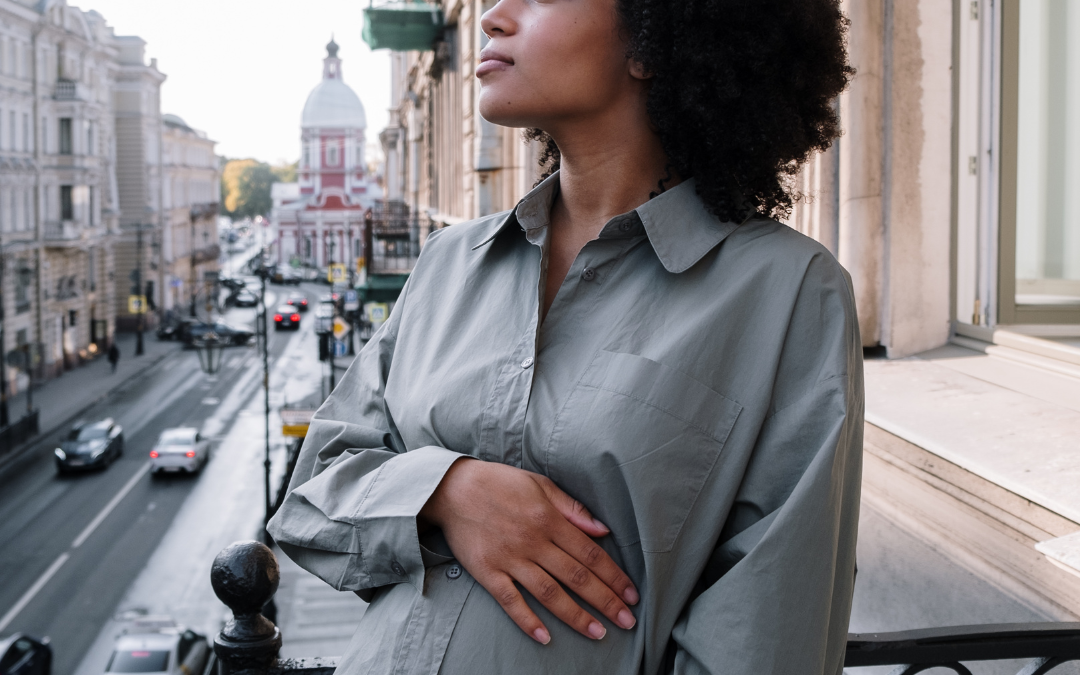For the last week or so, I’ve been sharing about a new mini-course, focused on Black maternal health. Expecting Excellence is new, but it’s based on experiences over years with Black women seeking out a doula.
Now, I want Black women to hire a doula because they’re wanting to have an experience that’s powerful and uplifting, and to greet their child in a way that feels right to them. I also would love if folks hired us because they know an expert in pregnancy would be helpful (because none of us can know all the things)
Unfortunately, a lot of women of color come to me with fear. And not just the usual “can I handle the pain” fears.
Black women tell me they want to hire a doula because they’ve heard that medical care is leaving Black mothers & families behind, and a doula being in the room to advocate for you is the solution.
And while I’m so glad that they reach out, it breaks my heart a little bit every time. Because it’s very hard to have a healthy happy pregnancy if you’re afraid of dying. It’s hard to get ready for birth that way.
For the seven years I’ve been a doula as a career, I’ve avoided leaning into much marketing around this. I have never wanted to feed into this fear- it’s an icky way to drum up clients in my opinion. (I still feel that way, but go with me here.)
A few weeks ago, I realized that by wanting to avoid the scare tactics, I wasn’t addressing a need Black mothers-to-be have, that I can respond to.
I was teaching a private childbirth education class, and the expectant mother was there- a Black woman- along with her mom, and her husband.
Things started off great, when mom said that “Respectfully, I think you should know that my husband doesn’t think we need the whole 4 hours for this birth class.”
I try not to bring my ego to this work, so I thought “Ok, cool. We can do an acceleration of the accelerated class.” I decided to approach with some curiousity though. When I asked why, I learned something very surprising.
This couple had taken FOUR birth classes. So of course now I have even more questions. Why? When? And what are you still hoping to get from me??
I also had to ask her if she was anxious about birth, and this was an attempt to feel more calm by knowing everything she possibly could.
Now, some of it was logistical- it took a second to schedule our class, so she scheduled another in person one. And also she wanted to take the class her doctor recommended. Then the hospital recommended one too.
She said mostly she wanted to physically practice comfort measures techniques, and have her mom learn. And I though, “Ok, I got you!” So for the next hour or so we’re on the ball, we’re on the yoga mat, we’re talking through the stages of labor and when to use what. Then we talked through what it’s like at her hospital. It felt productive- her mom felt prepared, they said they actually did learn a couple of things, and I’m ready to give myself a pat on the back.
At the end I ask if they have any questions (because I always do, and most people do.) That’s when things get real.
The husband looks at me, very sincerely after an afternoon of jokes, and says, “Listen, what I really need to know is how do I make sure I don’t lose my wife?”
And it was one of those moments where things become crystal clear- why I’m a *Black* doula and what so many of our Black clients need.
This wasn’t just idle fear for him. They told me a story about a friend of theirs that had heavy bleeding after her birth and struggled. In their story, it sounds like someone noticed, but didn’t take action right away, and it ended up being more dangerous for her. Thankfully, that mother and that family are fine now. But of course, now this soon to be father is worried.
This man had gotten the message (from his own experience and Black maternal health advocates) that birth isn’t always safe for Black women, and he wanted to be sure his wife would be safe.
I related to that- a loved one wanting to just do right by their family member. And I wanted to make sure he had the tools that would calm his fears and give them genuine action steps.
I realized that we don’t do that in childbirth classes. As birth workers, we tend to focus on people enjoying birth, and feeling autonomous, and (while it’s not me) some of us focus on less medicated births and more people having access to that. All of that is important and valuable.
But we’re skipping a step if our people are still trying to just survive.
It’s especially a lot of pressure on partners. I asked on my instagram stories last week, and most people (83%) had their significant other as their birth partner. (Only 13% hired a doula, on a doula’s instagram!) Some of this is probably due to COVID limiting the number of people in birth rooms for the last few years. But some of it is because, in that moment, you want someone you already trust with you.
But even the most prepared partner doesn’t usually know what to expect during prenatal appointments, and from their nurses, doctors or midwives in the hospital. We teach lots about how birth typically unfolds. We’re often speaking to “normal” or “physiological” birth, because we want to set the expectation that things will go smoothly. And while we might discuss common interventions, it’s more with an eye to the pros and cons of each, rather than “this is the standard of care.”
I think childbirth classes have come from a place of informing families, but assuming that the medical staff will take care of their part (and hopefully not interfere too much).
The thing is, Black families aren’t making that same assumption that the doctor or midwife will take care of them. And as Black maternal health advocates, we have told them that they can’t! But then we left a gap.
So Expecting Excellence is what I’m offering so you and your birth partner have answers. As a doula, and a childbirth educator, I want to close the gap in my education. And I want to actually share information about Black maternal health that families can take action on.
Because when it comes to hemorrhage, I know what is done standard to prevent that:
- There’s usually pitocin given after birth. Your baby latching (if you’re breastfeeding) does the same thing. The end goal is to continue to bring about contractions that close your uterus using your own oxytocin, pitocin given through an IV, or both.
- You OBGYN or midwife checks the placenta to ensure it comes out whole and nothing is left inside.
- If you’ve given birth and you remember that fundal massage (it’s not fun or relaxing) where they pressed deep into your belly? It was also prevention. The fundus is the top of your uterus, and the nurse is checking your body’s immediate healing. Then they go and look at your pad, to see if the blood is an acceptable amount.
- Finally, hospitals send you home with discharge paperwork that advises you to be seen if you’re soaking a pad per hour, or you’re passing clots bigger than an egg, or a golf ball.
Even in our flawed system, there are safeguards in place. Thank goodness. And as I’m listing these, this man is taking notes. And I realized that while I still don’t want doula work or birth classes to lead with fear, we have to get people the information they’re craving if we’re going to support them in the midst of the Black maternal health crisis.
So that’s how Expecting Excellence came to be. It’s very valuable, but I’m pricing it less than a birth class and less than a doula. It’s also QUICK. Because I want this information in people’s hands and I want you to have this knowledge fast. You’ll watch 5 videos (one is an intro), that are designed to help you take quick action. You’ll receive several resources including an Excellent Care Checklist what Plan J, so you can walk away prepared.
THEN you can get ready for an amazing birth.


